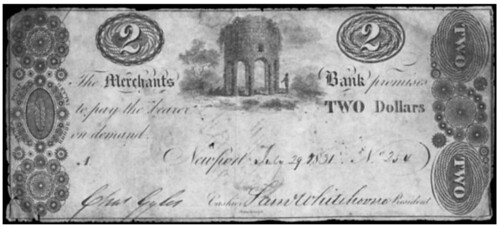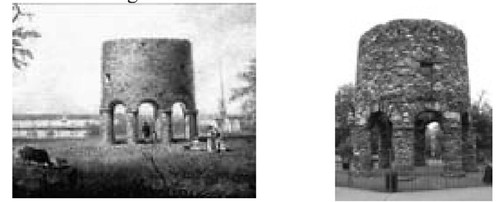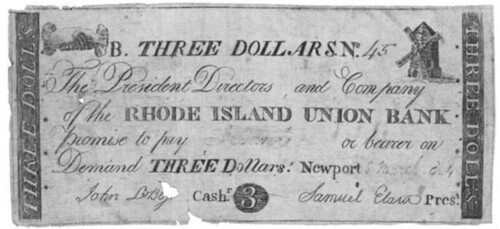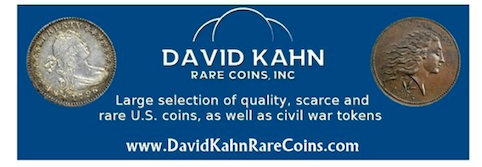
PREV ARTICLE
NEXT ARTICLE
FULL ISSUE
PREV FULL ISSUE
THE MYSTERIOUS NEWPORT TOWERThe New England Numismatic Association's official publication is NENA News. John Ferreri offered to share some articles with E-Sylum readers. Here's a token article that caught my eye - it's from the March 2021 issue by John himself, on the mysterious tower seen on Rhode Island paper money. Thanks! -Editor 
This 1831 $2 note of the Merchant’s Bank of Newport shows the mysterious tower in Truro Park in the city of Newport, RI. This was built on hilly land at one time owned by Benedict Arnold, the great-grandfather of the Benedict of Revolutionary War fame and disgrace. Notice the amount of intrusive brush that flows over the stone sides, indicating that even in 1831, the date of the engraving, this structure must have been quite old. The fact that it still stands is a testament to the workmanship involved when it originally was built. The note was engraved by Peter Maverick an outstanding banknote engraver of his day and will show the uncluttered and precise qualities of his work.
Collecting Obsolete Banknotes can sometimes turn into an archeological event as with the image of the So, what is the tower? Good question! In the past it has been called by various names and attributed to various peoples. It is a sturdy structure made of uncut stone and mortar not unlike the stone which may be found in the immediate area of Newport. Today it rests in a small park surrounded by Pelham, Truro W. and Mill Streets and Bellevue Ave. It is round, has eight legs and arches and seems to be missing a floor or two inside. There are niches made in the inner wall that could be for floor joists or maybe for the inner workings of a mill. 
Two different pictures of the Newport Tower, one a painting and the other, a modern photograph. It seems that no written records of its architect and construction are known. Was it a windmill built by the elder Arnold or could it be that the Vikings landed here in years past and constructed this tower with which to burn brush and signal to others off shore on ships, of their whereabouts? Or, could it have been built by some Chinese explorer who came ashore here to erect a tower, similar in appearance to those made in China during the Song Dynasty in the 1840’s? Some believe that the Knights Templar had a hand in its construction as they were master stone builders. The most believable theory (to this author), would be that it was designed and built by Peter Harrison, a widely known master architect both in Newport and other areas of the Colonies in about 1750-1770. This time frame for the Tower has been confirmed by carbon dating of the mortar substance found in its matrix. The tower itself is 28 feet tall and while rough in appearance, is actually sturdy enough to have withstood almost 300 years of New England hurricanes, tornadoes, ice events and bomb cyclones that seem currently to be in vogue! It has witnessed the church marriage of at least one President (John Kennedy) and is a neighbor to various late 1800’s industrialists’ mansions built high above Easton Bay on the east shore of the town. 
This counterfeit note dated 1804 and issued by the Rhode Island Union Bank shows very poor workmanship, especially with the lettering. However this note may show the one clue that proves the original purpose of the Newport Tower! Credit for this image goes to Stack’s Bowers Galleries. The image was previously shown in banknote form in Volume 5 of the Whitman Encyclopedia of Obsolete Paper Money. So, what did he build? The vignette on this other Newport banknote of the Rhode Island Union Bank printed in 1804 certainly shows a structure that is unmistakably, a windmill. The note is probably a counterfeit (there are no known genuine $3 bills like this) but wouldn’t a counterfeit note have an almost exact resemblance to the genuine? And, with the abundance of wind coming off the sea, a hill in Newport would be a natural place to build a windmill! The next time you visit little old Newport you might want to stop at the Tower to see what exactly you think of it! If current banknotes used in Newport could display scenery of local areas what do you think would be shown on them, the Cliff Walk, Castle Hill Lighthouse and the Tennis Hall of Fame? This is what makes collecting U.S. Obsolete Paper Money so interesting. One never knows what scenery will be found on these bills. Sometimes it is up to the reader to identify it! Historic structures, wartime battles, identifiable street scenes, famous ships and historic moments are captured in the artists vignettes used on many of New England’s mid 1800’s paper money issues. This note is a good example! To learn more about collecting paper money or to inquire about membership in the Currency Club of New England contact Kevin Lafond, P.O.Box 4724, Porstmouth, NH 03802-4724 or kglafond@comcast.net, phone (603) 498-2042.
For more information on the New England Numismatic Association, see:

Wayne Homren, Editor The Numismatic Bibliomania Society is a non-profit organization promoting numismatic literature. See our web site at coinbooks.org. To submit items for publication in The E-Sylum, write to the Editor at this address: whomren@gmail.com To subscribe go to: https://my.binhost.com/lists/listinfo/esylum All Rights Reserved. NBS Home Page Contact the NBS webmaster 
|